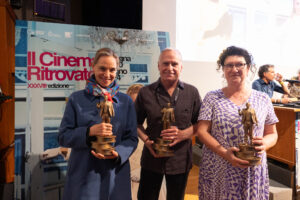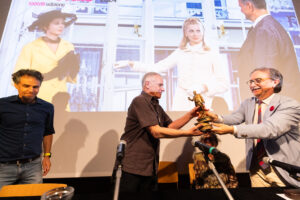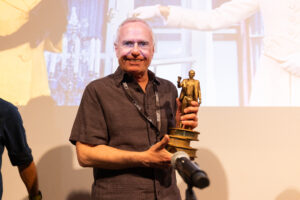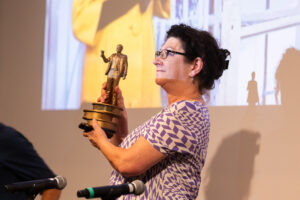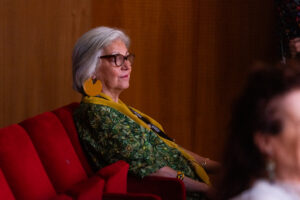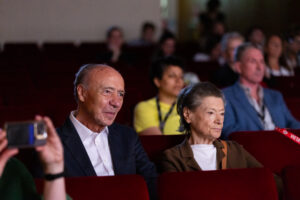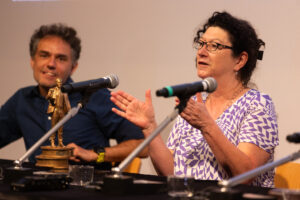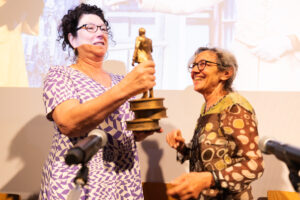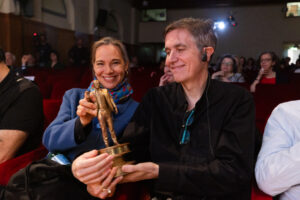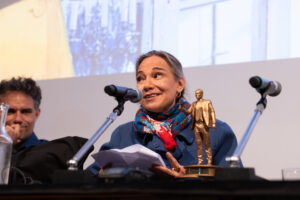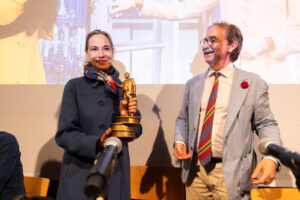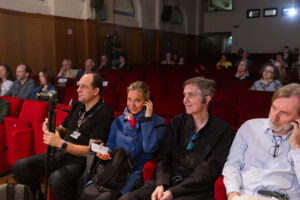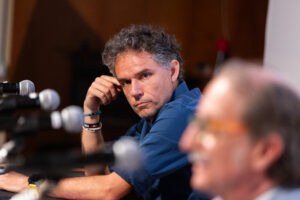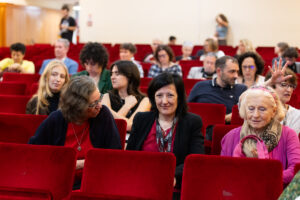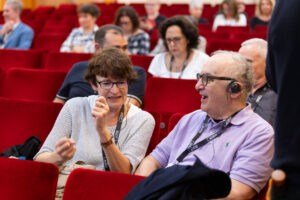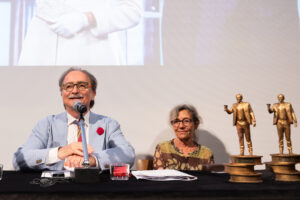Vittorio Boarini Awards
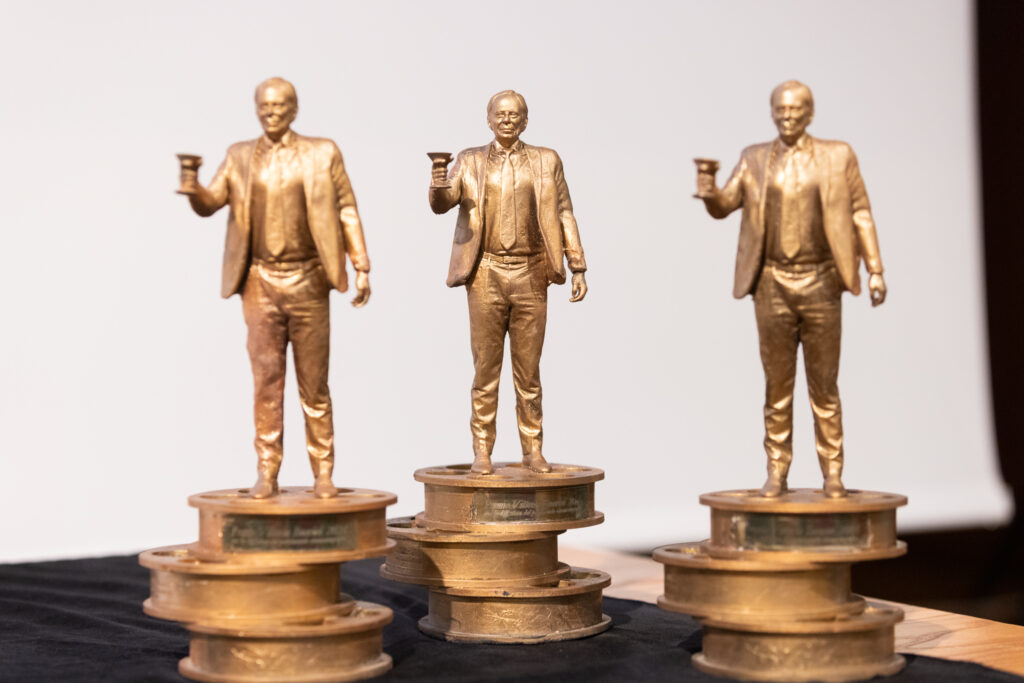
In honour of Cineteca founder, Vittorio Boarini awards are given to international figures who have distinguished themselves in the safeguarding and diffusion of cinema heritage.
This year the award went to Grover Crisp (Sony), Bryony Dixon (BFI) e Daniela Michel (Morelia International Film Festival).
Motivations
Daniela María Michel Concha has been the founder and general director of the Morelia International Film Festival since its inception in 2003. In the often uniform world of international festivals, Daniela Michel has introduced a refreshing and unique perspective. She is an elegant, competent and affectionate woman with profound knowledge of both contemporary and classic Mexican cinema. As Guillermo del Toro once said to me a few years ago, Daniela is the honorary consul of Mexican cinema worldwide, and all Mexican filmmakers owe much to her efforts in promoting our works internationally.
Daniela possesses all the necessary qualities. She is humble, always stepping back to highlight others instead of herself. Her boundless curiosity and tireless work ethic drive her to achieve demanding, cultured and complex projects.
Thanks to her, the Morelia Festival has gained a reputation comparable to Telluride and Cinema Ritrovato, becoming a cherished festival of discovery with film choices that attract an international community of specialists who seek more than the familiar. For instance, the festival’s work has led to the recognition and programming of great Mexican melodrama filmmakers from the 1950s and 60s, such as Emilio Fernandez, Julio Bracho, Roberto Gavaldón and Alejandro Galindo, in numerous film archives. Daniela has a knack for achieving the impossible. Her efforts have resulted in the restoration of many Mexican classics by film archives and Martin Scorsese’s Film Foundation, or have secured significant sponsorships.
It’s impossible not to notice her in a crowd. Her distinctive style seems crafted by a graphic designer, disguising the soul of a fierce advocate for beauty under the facade of an elegant woman from Mexico City. Deeply rooted in her Mexican heritage, Daniela is foremost a citizen of cinema.
Vittorio Boarini never had the opportunity to meet Daniela or experience the Morelia Festival, but there’s no doubt that if he had gone once, he would have come back year after year.
Grover Crisp has dedicated his entire career to the preservation and restoration of film heritage. His unwavering commitment to Sony Columbia and his pioneering role in the world of film restoration have established him as a true trailblazer, especially during a time when the concept of restoration was still emerging.
Grover was the first within American studios to recognize the importance of preserving and restoring cinematic heritage. He viewed this heritage not just as relics of the past, but as vibrant entities capable of living multiple lives, generating renewed interest and possessing significant economic potential. His foresight opened new avenues in both photochemical and analogue restoration, and later in the digital realm, where he approached new technologies with methodical intelligence and insight.
He boldly undertook the then-audacious project of a 4K black and white restoration of Dr. Strangelove, demonstrating that even the most modern technologies, as later with HDR, could be innovatively applied beyond just the latest colour films.
Among his many legendary restorations are Lady from Shanghai, Easy Rider and Lawrence of Arabia in 70mm, which was presented at Cinema Ritrovato in 2012, marking the pinnacle of an era filled with great restorations that the entire industry would come to emulate.
Grover Crisp’s work also had the significant merit of fostering a dialogue between American studios and public archives and film archives, an endeavour that many had attempted without success. Alongside Michael Friend, he curated and organized the essential technical conference “The Reel Thing”, facilitating discussions among lab technicians, archivists and conservators. While other organizations in the field struggled to promote such dialogue, Grover Crisp managed to establish a virtuous model for the future—an essential, continuous and open dialogue between public and private sectors.
Through his work, Grover Crisp opened a new era and established standards that guide our efforts today. He has not only honoured the past but has also ensured its vitality for future generations with passion, vision and unwavering dedication.
The Award goes to Bryony Dixon, film historian, writer, archivist, researcher, connaisseur of music-hall culture, film restorer, organizer of events and festivals and Curator of Silent Cinema at the BFI national archive since 2004:
– for her outstanding achievement in bringing the films from the past to the present, from invisibility to new life, from oblivion to new recognition;
– for her untiring work of three decades for the benefit of audiences organizing screenings and special events giving people the unique pleasure of living the experience of silent cinema;
– for her constant endeavor and fight for underrated and unknown productions such as Early Cinema, Non fiction films, women in silent cinema and British cinema in general, to have their due place and space in film history;
– for her generous and unstinting help to projects of other archives, universities, researchers and festivals worldwide. She has been for the Cinema Ritrovato an important ally proposing and curating entire strands and contributing films, programms and wonderful texts to the Cento anni fa and the rediscovered and restored strands, among them the works of Alma Reville and all silent films of Reville’s husband, Alfred Hitchcock, which she has restored.
In all these years Bryony Dixon has been a friend of the cineteca di bologna and crucial for the realization of projects of such as the Chaplin project, the repatriation of Italian films in the Joye collection and the programm and dvd on Comic actresses and suffragettes.
Her work covers an amazing range of fields and topics, including Bandits, Suffragettes, Fashion, Expeditions to Antarctica , Colour in Silent cinema, Hitchcock and Chaplin. The deep knowledge of Victorian Music Hall and Pantomime makes her one of the world’s leading curator of programmes of that beautiful, strange and difficult part of film History, Early Cinema. She has launched a restoration project on the vast collection of Early British Films at the BFI which ultimately led to her latest Book, The Story of Victorian Cinema, published in 2023. last in a long long list of publications.
As a lead curator she has realized scores of restoration projects in the last twenty years, since 1998 she co-directs a peripatetic silent film festival in Britain and curates the monthly Archive specials programmes at the national film theater.
Last but not least she is famous for her unruffled calm and dead-pan humour in the moments of adverty and disaster – that occur with regularity when working with silent film.




